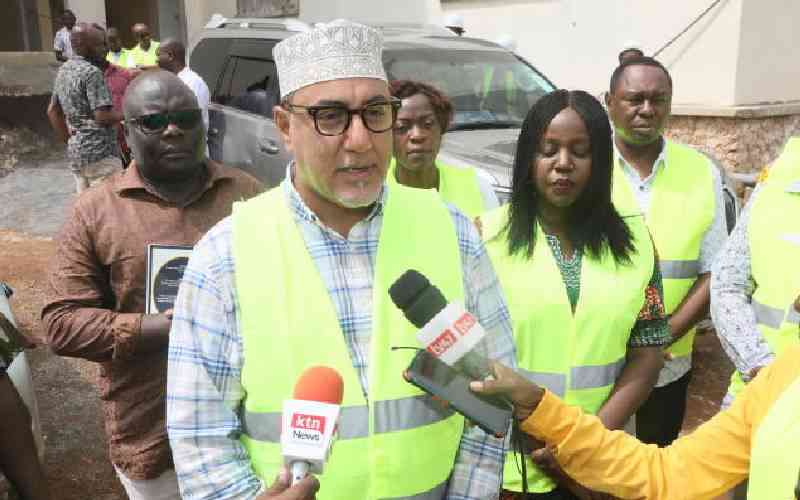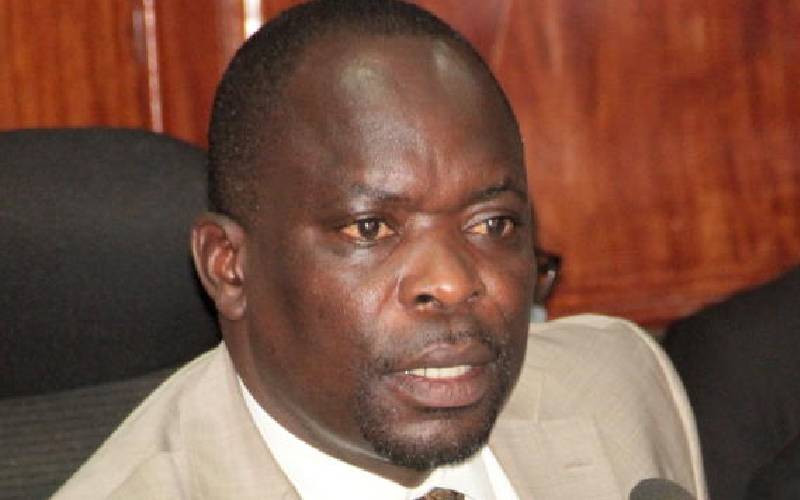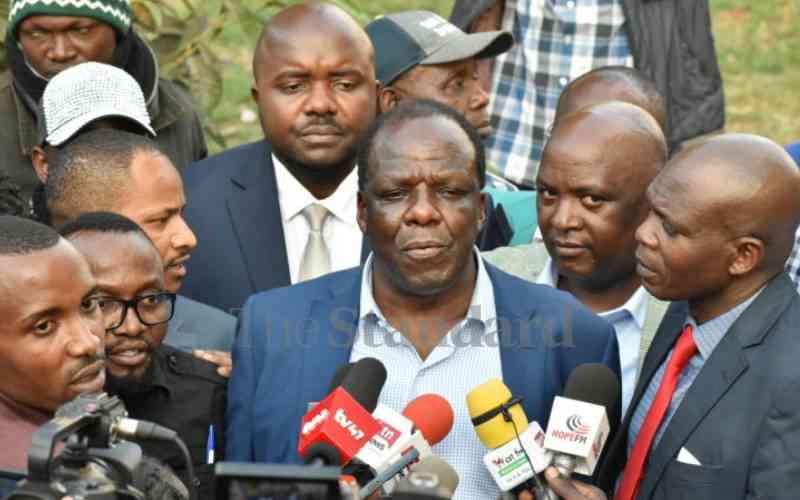 |
|
Gladys Chepkechei during the recruitment at Kabarnet ground in Baringo County, where she was disqualified. [PHOTO: BONIFACE THUKU/STANDARD] |
BARINGO COUNTY: Until July 14, 2014, Gladys Chepkechei Tarus, 24, had kept her hope alive that she would join the revered Kenya Police Service. That she had been rejected four times in previous recruitment drives was not enough to dampen her spirits. But the recruitment in Kabarnet, Baringo County, was a repeat of an all-familiar experience culminating in tears and hopelessness.
For the five times she has tried her luck in joining the security service, Ms Chepkechei has no idea why she has been dismissed rather casually by recruiting officers. “You are medically unfit for the job”, she is often told.
The jinx of being hauled out of the Recruit Training Station (RTS) in Eldoret after the military rejected her claiming she was pregnant in 2010 despite results from an independent doctor showing otherwise, continues to follow her.
In 2012, the Kenya Defence Forces (KDF) did not allow her to participate after she was told her case was yet to be concluded. When she took part in the 2013 recruitment, she was told she was medically unfit.
In 2011, having been rejected by KDF, she tried her luck with the Kenya Wildlife Service rangers but she was unlucky as she was told her KDF case was yet to be concluded hence she could not be allowed to participate. But she was not going to give up. During the 2013 police recruitment, she was among thousands of applicants who showed up at Kabarnet Stadium. After all tests, she was again disqualified on medical grounds.
Since 2010, Chepkechei says she has been dismissed on unexplained medical grounds in what she believes is blacklisting by the members of the disciplined forces. When The Standard on Sunday visited her at her parents’ home at Kabarbarma in Ngetmoi, Baringo County, Chepkechei, once a vibrant and bubbly soul, is now withdrawn and disillusioned. Her desperation and desolation has made her believe no one in the world has the heart to bring justice to the poor. “I am nearly concluding no one is fair in this world. I am left hopeless,” she says.
On the recruitment day, Chepkechei woke up in high spirits. The talented athlete, who had been training for a month in preparation for the rigorous exercise, said she knew she was among the best suited for the job. Her Kenya Certificate of Secondary Education (KCSE) grades were within the minimum requirements advertised by National Police Service. “I passed KCSE, I was physically and medically fit. The slots provided per station were also enough, and I was almost sure of securing a position unless something weird happened,” she says.
Won race
After passing the preliminary stages, she says she emerged the best after leading in the four-kilometre race, which, according to her, saw some of the officers make fun of her, saying she was “faster than the police vehicle”.
She says she started reading mischief in the manner in which some recruiting officers paid little attention to her performance.
The shock of her life would come at midnight after the officers took longer than necessary to release her medical results. The athlete says she was among the first in the list of those announced as medically unfit and was shown the door minutes after 1am. She almost collapsed.
Most baffling is the fact that the officers relied only on urine samples. Days later, she sought an independent medical test which turned out negative for every disease tested.
Suspiciously, she says the Personal Assistant to a local MP kept on directing major activities in the police recruitment room late into the night. She recalls that other acquaintances linked to influential persons made numerous calls inside the room. “I swear a man who had been dismissed on medical grounds was recalled after someone called and he was handed a police call form,” she says amid sobs.
According to Chepkechei, they were initially 30 women picked after the running, which ended at 2pm. But another 20 were brought in at around 11pm by senior police officers in a suspicious manner. “The women brought in at night had not made it in running but no one had the guts to question why they came in,” she says.
Chepkechei, a former student of Timboiwo Day Secondary School pulled the attention of the nation in 2010 following her dismissal inside the barracks after passing all the tests only to be told she was pregnant.
Stay informed. Subscribe to our newsletter
Armed with her Service Number 109524, Chepkechei vividly recalls how military officers embarrassingly pulled her out of a morning recruits parade at RTS two days after she reported.
Forlorn and staring blankly into space, she says the officers dragged her into the open and announced her pregnancy to everyone. She was told to pack her belongings and vacate the station.
When she insisted to know exactly why she was being harassed yet they were the ones who determined she was fit, the menacing officers, she recalls, told her she was wasting her tears and should go home. “I cried at the gate for hours but they dragged me out. I knew I was not pregnant,” she says.
Even after returning with a negative pregnancy test conducted in an Eldoret Hospital, the officer put her into a military ambulance and rushed her to Mediheal Hospital where doctors maintained she was not pregnant. She was then dismissed. “They told me my vacancy had been occupied and I should go stay at the Gilgil military base so that they could consider me on their next recruitment,” she says.
Since her father passed on in 2001, Chepkechei has been living a difficult life; their bed-ridden mother has left her eight siblings under her care. The athlete engages in farm work to fend for her siblings.
She calls on the Independent Police Oversight Authority and the Ethics and the Anti-corruption Commission to intervene as she believes someone in the security forces may have blacklisted her following the spotlight she drew on the KDF in 2010. Baringo Human Rights Consortium Chairman Kipruto Kimosop who testified before the Parliamentary Committee on Defence in 2010 to unravel the mystery surrounding her ouster at RTS said the police should now be compelled to produce the medical report they relied on to disqualify her.
Observer group
He, however, wants the Government to institute an independent observer group to oversee recruitment to ensure such cases are settled in the best ways possible. “The Constitution does not allow anyone or any agency in the country to blacklist any Kenyan from employment,” said Mr Kimospo.
But Baringo Central Deputy Commissioner Noah Tanui, who chaired the recruitment committee dismissed any fishy dealings meant to bar Chepkechei. He confirmed she led in the race and passed major tests but failed at the medical section. He said the medical team did not share the medical reports with the committee.
“Of the 49 slots, we successfully recruited 12 women but the medical team only indicated ‘fit’ or ‘unfit’ on the medical records of recruits, therefore leaving me and my committee with no knowledge on what they were testing even after some results were contested,” says Mr Tanui.
 The Standard Group Plc is a
multi-media organization with investments in media platforms spanning newspaper
print operations, television, radio broadcasting, digital and online services. The
Standard Group is recognized as a leading multi-media house in Kenya with a key
influence in matters of national and international interest.
The Standard Group Plc is a
multi-media organization with investments in media platforms spanning newspaper
print operations, television, radio broadcasting, digital and online services. The
Standard Group is recognized as a leading multi-media house in Kenya with a key
influence in matters of national and international interest.
 The Standard Group Plc is a
multi-media organization with investments in media platforms spanning newspaper
print operations, television, radio broadcasting, digital and online services. The
Standard Group is recognized as a leading multi-media house in Kenya with a key
influence in matters of national and international interest.
The Standard Group Plc is a
multi-media organization with investments in media platforms spanning newspaper
print operations, television, radio broadcasting, digital and online services. The
Standard Group is recognized as a leading multi-media house in Kenya with a key
influence in matters of national and international interest.









